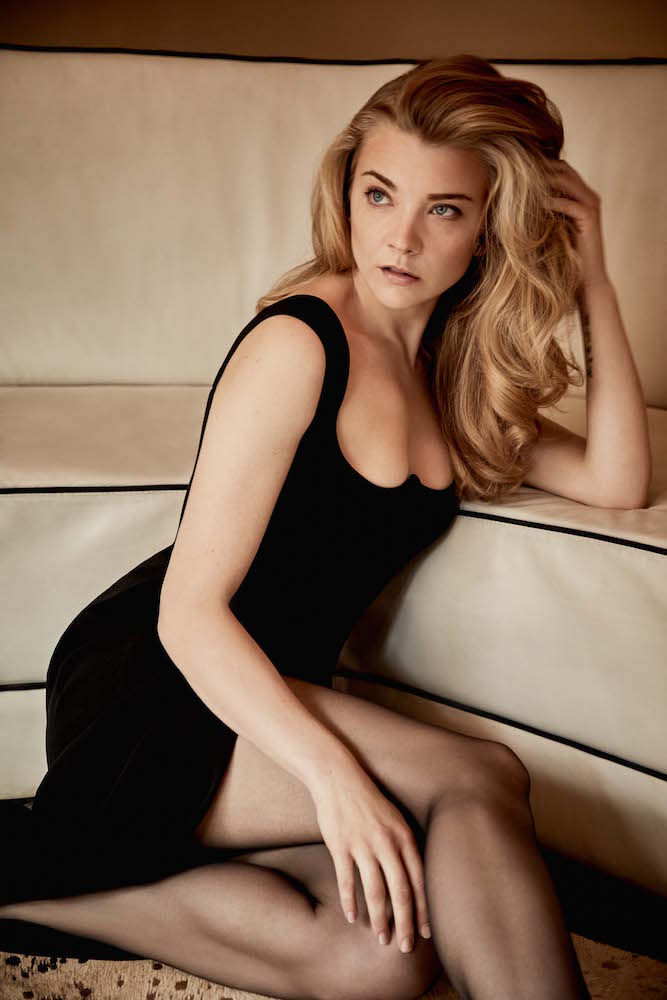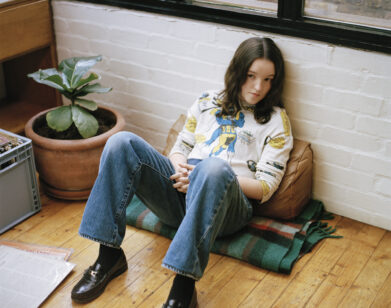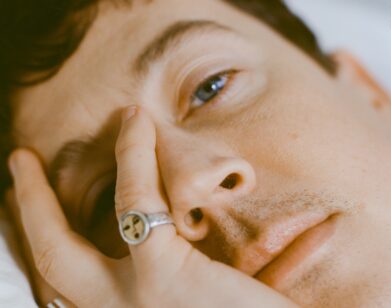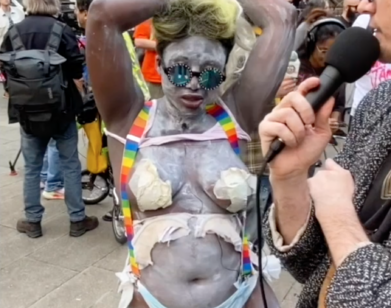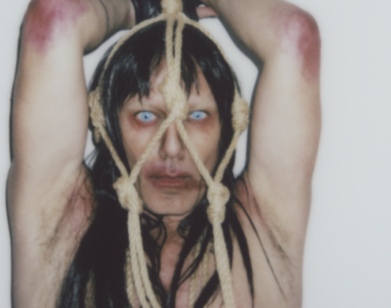Natalie Dormer explores the human condition in her dark new role
Shooting on the stairs to the Django jazz bar at The Roxy Hotel in New York City, as guests pass by, blinking incredulously on their way to the restroom, Natalie Dormer transitions in and out of character, telling them to go ahead before popping right back into a hand-in-the-hair pose and an I’m-hot-as-fuck-but-don’t-fuck-with-me gaze. It’s true—she’s hot as fuck and it’s also true that you probably shouldn’t fuck with her.
Fans might find that easy to picture after watching Dormer climb the monarch ladder as Queen Margaery Tyrell in the sprawling HBO series Game of Thrones, or rebel against a tyrannical regime as Cressida in The Hunger Games film franchise. But she brings that natural intensity to her latest role, too, as headmistress Hester Appleyard in the new Amazon series Picnic at Hanging Rock, a remake of the movie adaptation (1975) of the novel by Joan Lindsay (1967). Three young women vanish mysteriously while on a picnic at Hanging Rock, in Victoria, Australia, with their boarding school, and Appleyard is left to handle the aftermath.
Appleyard is spiteful, oppressive, and clearly damaged, in all those ways she is unlike Dormer, who is full of charm. In unguarded moments, she can be caught cracking jokes and befriending everyone on set. She is careful when we talk, though, wary of being misunderstood or taken out of context, but never afraid to voice her opinion. For instance, Dormer is in a corset again, in the 1900s—although she’s been worried about getting pigeonholed into period narratives, this role just felt right. It was the challenge of finding light in a dark character, that attracted her, the same way she wants to find positivity in the tumult rocking Hollywood.
“I act to process my terror of what’s going on in the world politically and socially, and, economically,” Dormer says. “It’s fun to do a photoshoot with some really talented, creative guys and create cool images, but I do this job so I can act, so I can process my angst.”
Soon, she’ll also make a writing debut (her new film In Darkness comes out May 25). She’s also working on a few nascent production projects, basically getting behind the camera to tell the stories she wants to tell, in her own words.
JANE GAYDUK: I’m turning the recorder on. No pressure.
NATALIE DORMER: No pressure. Don’t say shit or fuck. [laughs]
GAYDUK: So, you grew up in the English countryside. In Berkshire?
DORMER: Berkshire is a county, so it has countryside and a lot of towns as well. But I moved to London when I was 18, so I spent half my life in London. I really feel like I’m a Londoner now. And there’s a simpatico between New Yorker and a Londoner in the way they think. Are you from New York?
GAYDUK: New Yorker, yeah.
DORMER: Born and bred?
GAYDUK: I was born in Ukraine but I grew up in New York.
DORMER: [Picnic at Hanging Rock] director Larysa Kondracki is Ukrainian as well. She says there’s fire in that culture.
GAYDUK: I hope so!
DORMER: Do you speak Ukrainian?
GAYDUK: I speak Russian.
DORMER: Larysa, when she was directing me in Picnic at Hanging Rock and trying to articulate herself on set, she was like, “Look, English is my second language okay?” She’d be gesticulating and I’d be like the Ukrainian is coming out, it must be serious. She’s talking about a dramatic moment.
GAYDUK: Can you give me an example of said dramatic moment?
DORMER: There were so many dramatic moments. You need find yourself at the top of the Hanging Rock, in the Australian outback, trying to choreograph thirty schoolgirls and horses and the elements. There were dramatic moments, but it all translates beautifully on camera. It’s very atmospheric. There is a lot of high drama in Picnic. She navigated that beautiful, I’m her biggest fan.
GAYDUK: What were some of the elements you guys had to endure?
DORMER: Oh my God. It’s Australia, so the heat for one. When I arrived it was the end of summer, it was still really hot. You see in Picnic at Hanging Rock, when Appleyard is telling the girls to keep their hats and their gloves on in that kind of heat, the physical repression of those young ladies, as well as the emotional repression. It’s harsh. God, I would not have wanted to be a woman wearing a corset in the scorching heat in 1900.
GAYDUK: You’ve done a few period pieces throughout your career and I read that you enjoyed studying history. What attracts you to the subject?
DORMER: It was always my favorite subject at school, other than English and drama. But I don’t see them as disparate things: history and drama are about cause and consequence. It’s storytelling. Well, you could argue, some history is storytelling anyway, it’s the storytelling of the victors. But it’s about the human condition. It’s about exploring the human condition and the choices we make and their ramifications. In that way, history is the same as good drama.
So my first big job was with The Tudors, it was a pairing of my two favorite loves, acting and history, but I wanted to be able to turn Picnic at Hanging Rock down [at first] because I don’t need another corset to my name. I’m trying to fight to get out of this pigeonhole. But after I read the first cut of Bea Christian’s script and after I spoke to Larysa for 90 minutes on the phone, I was like this is such an opportunity to work with such a talented core team, creative team, and I was really intrigued by the idea of Australia wanting to prove that they could make prestige television. The cable television that Americans and Brits are all so okay with making…I was intrigued by this idea of this nation going, oh hang on, we can play this game too and we’re going to do it with this story, it’s really their national treasure story, it is the jewel in their crown, Picnic at Hanging Rock, Joan Lindsay’s novel and obviously people are aware of Peter Weir. They study it at school. It’s in the cultural consciousness, that story, and people don’t know if it’s true, they don’t know if it’s historically a real story of whether its not.
So I was so impressed with Larysa when I spoke to her, and so impressed with Bea’s writing, it didn’t read like a costume drama. And I was intrigued by the idea of going to the other side of the world–the impact Australia has on you the first time you see it! For all those reasons, I went sure, oh shucks, I think I’m getting in a corset again. Have you seen any of it?
GAYDUK: The first two episodes.
DORMER: You tell me but to me it feels incredibly modern in its sensibilities.
GAYDUK: For sure—I didn’t realize how much of a fantastical element it would have. Everything surrounding the disappearance felt very mystical.
DORMER: Yeah. It’s got a magical realism, a surreality to it. And that was on the page on the scripts—Larysa gave references to David Lynch in pre-production and there were photographs that edged towards that surreality. There was something of Lewis Carroll, there was something of David Lynch. There was something magic, surreal. That’s the beauty of Picnic, is this mash of genres and we get away with it, it’s like a comedy in places, it’s high melodrama in places, it’s a thriller. I think Larysa calls it an enchanted thriller, but it has all this mishmash of different genres, and it has gothic edge to it as well. It gets away with it all. We could all feel that on the shoot, so there was a lot of playing to work out what would stick, and I’m really proud of the result.
GAYDUK: Your character Hester Appleyard is not a very sympathetic character. Not a villain but possibly—
DORMER: That was one of the things that was said to me by the team behind it, that was what made it so flattering to be asked. It was sold to me like very few actresses would be able to find the humanity and the vulnerability in her without just making her a two-dimensional villain. And I’m always interested in finding what’s behind the monster, because no one’s born like that. I mean, unless you’re born a psychopath, but Hester Appleyard is not one. But if you’re not playing a psychopath, there’s obviously a journey that makes someone cruel or makes someone tyrannical, and it’s normally based in their fear and their pain. Over those six hours, the layers get peeled back and you see how she became who she is. Appleyard’s story is a tragedy because in trying to liberate and give these girls the tools to cope with society, she actually stifled them and disallowed them the liberty of coming up with their own thoughts, which isn’t as anachronistic from our modern day as we’d like to believe.
We’re constantly told how we should think and feel as young women as opposed to working it out for ourselves. If only we’d learned more in the last 118 years. So there is a scary throughline there, of the older generation trying to empower the younger generation with their advice but instead just repressing them. And then obviously the girls, Samara Weaving and Lily Sullivan and Maddie, they have this wonderful journey of the defiance of that, which is so bold and beautiful to see. It’s so spirited. But yeah, I wanted to fill in the gaps and not make her a monster, you see more of her past from London, you see what she’s running from, you see the trauma she’s going through. I try and humanize her, I mean of course she’s a bully, and ultimately I felt that toward the end of the shoot that residue of having been a bully was —sometimes as an actor you realize way toward the end of the shoot, I actually don’t think I like this woman. That only happened to me in the last few weeks, I felt sad for her primarily.
GAYDUK: You could look to your Game of Thrones co-stars for help on how to deal with that residue.
DORMER: Yeah exactly. I’ll call up Jack Gleeson [King Joffrey in GoT].
GAYDUK: So the other thing, Appleyard is this villain but she also is, as the headmistress, a mother figure in this show.
DORMER: Yep. She thinks she’s doing them a favor. She totally thinks that what she’s doing is giving them the tools that will equip them for life. She believes her motivations are ultimately for the girls’ benefit.
GAYDUK: Sometimes it feels like for actresses you need to go from playing a sexy young woman to a maternal figure even if you’re not the mother in this show. It seems like there aren’t a lot of spaces for women to just be the lead role after a certain point, as an individual person, if that makes sense.
DORMER: That’s not my experience in the choices I’ve made. In Darkness, which is coming out at the same time as Picnic, I mean I was maternal. I was playing Anne Boleyn when I was 23—I was playing a mother. You can perpetuate that narrative if you want, it exists, but it’s not something that you can overtly see in my career. I avoid, on purpose, the roles that are just the wife, just the girlfriend, just the mother. We all have to earn our stripes. I did a bit of a turn as femme fatale for a few years, but I did it with some very talented and famous directors that I would have been idiot to turn those roles down. It’s a choice, is what I’m saying.
Good scripts are out there, sometimes you have to sit and wait for them. If you want to work every single moment of every single day, then maybe that generalization that you’re talking about becomes apparent. But if you wait for quality projects to come along, then that’s not my direct experience. And I think especially with the dialogue that is happening now in Hollywood and back at home and everywhere within the industry, now we should see the ramifications of that. What I’m saying is, it is possible, because you’re quite right. I started writing In Darkness nine years ago because I was frustrated with the landscape, but I found male producers who supported me and I got my film made. Let’s be positive. You just have to persevere and you have to be shrewd in your curating, because since I started writing In Darkness, the scandi-noir wave happened where these anti-heroines came to the fore in things like The Killing and The Girl with the Dragon Tattoo and Denis Villeneuve happened and that French thriller. The anti heroine thing started to happen in the eight or nine years since I started writing that film.
And then I got to have a conversation with Larysa about Picnic and she wanted my input in creating a viable, flawed, central female with the same way we’re so used to seeing a flawed, central male, and I feel that it’s actually happening. And we’ll only see more of it because it takes so fucking long to get the money and find the schedule and get the talent’s schedule to line up. I think we should be very positive, I think we’ll see a lot of exciting things happening in the next two, three, four years of stuff coming out. That was a really long answer to your question, I hope it wasn’t too off of it.
GAYDUK: I really enjoy the work you’ve done!
DORMER: No, I know what you’re saying. But those are the stages in a woman’s life, when a woman starts to procreate or chooses not to procreate, because we give birth, we carry the kids. So it’s going to be reflected in drama because drama reflects life. [Maybe] we need more stories where a woman grapples with “I want to be a professional and a mother at the same time, how do I do that?”
GAYDUK: Or just not have motherhood always be part of the narrative, because it doesn’t have to define a woman’s life.
DORMER: Does it define some male roles, that they’re fathers? If you look back at the heroes and the male protagonists you really love, how many of their characterizations, or their motivations are also based out of their being a father? I mean a lot. Whether it’s fucking Star Wars, that has to do with parental issues. Or Breaking Bad, he started cooking up meth because he wants to support his son. In the Die Hard movies there’s parental-father love, it happens to the guys too.
GAYDUK: I agree with you. It just seems like we’re in a place right now where, as a woman, my instinct is to focus on the things that are wrong as opposed to what’s already become better, because you want everything to continue improving.
DORMER: Well you’re the young female journalist rocking New York City, so if you’re asking that, you must feel it.
GAYDUK: In terms of the industry as a whole I do, not necessarily in your body of work.
DORMER: I really do think it’s a valid question. That’s an interview in itself—that’s a thesis, right? But I agree with you. With everything that’s happening at the moment what we need to do is seize on the positive and what is changing. We need to constructively work toward what’s left to be done. Everyone’s got the memo now—I’m hoping everyone’s got the memo, we shall see.
PICNIC AT HANGING ROCK WILL BE AVAILABLE FOR STREAMING ON AMAZON MAY 25, 2018.

